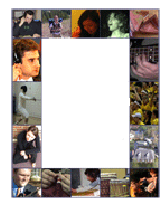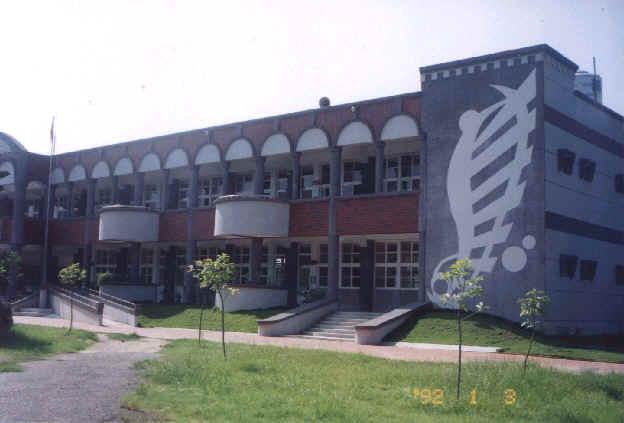
Sports
- The Outdoor Program helps people plan adventures.
- Adam Lake uses fencing to bring people together.
- Win or lose, the Pit Crew keeps Mac Court shaking for the Ducks.
- Tearing at jerseys and slamming into each other. It's women's rugby.
Changes
- A Taiwanese student finds adjusting to a foreign culture challenging.
- A close-up look at the ASUO president.
- A senior's abrupt transition to Eugene after Hurricane Katrina.
Arts
- A ballroom dance club president wears many hats and makes them too.
- Whether composing or jamming on his mandolin, Jesse Jones shares his love of music.
- Non-traditional African dance brings a new sense of community.
- The Student Fibers Guild proves that knitting isn't just for old ladies anymore.
- Halo Jones' music and art expresses his dark and light sides.
- A musician, student, activist and artist.
- For Ashley Maury, jewelry is more than decorative.
- A student TV show features news, sports, drama and comedy.
- A printmaking student goes beyond the studio and into the city.

Yin-Lun "Ingrid" Lin shares memories of Taiwan, and the challenges and rewards of living in the United States
By Carrie Pederson
As a teenager growing up in Taiwan, Yin-Lun “Ingrid” Lin imagined the United States to be a place where everything was “perfect.”
Even in home videos, taken by the parents of her friends on vacation in the States, Lin could tell American culture emphasized improvement.

Lin tells more about her perceptions of America |
The influence of American culture in Taiwan has led many young people to form an idealized image of the United States, and Lin was no exception.
She aspired to speak English with the fluency of her cousins who had emigrated to the States, not only to become more immersed in American culture, but to become a more marketable employee in Taiwan.
After graduating from high school in Taiwan, Lin enrolled in a community college in San Jose, Calif.
She soon realized that the America she had dreamed of as a high school student didn’t exactly reflect her new reality.
“When I was young I think I was too focused on outward appearance,” she said.
“I couldn’t see the struggles that my American cousins might have going through or the difficulties they may have been facing.”
Lin’s experience in America has revealed to her the difficulties in adjusting to a foreign culture.
“Alone, with no family here, there are so many difficulties,” Lin said. “People can’t understand your culture and it makes you feel homesick.”
School Life in America
Lin finished her associate’s degree in San Jose, and transferred into the public relations program in the School of Journalism and Communications at the University of Oregon.
“I am in love with P.R.,” she said. “It’s a chance to help people look good.”
Lin hopes to eventually find a job with an American public relations firm in Taiwan.
“America is more organized and developed in P.R. than Taiwan,” she said. “They are educated in a different way, and the concept is more worldwide.”
In spite of her passion for the topic, however, Lin has found the adjustment to the laid-back, open forum of American classrooms somewhat difficult.
In Taiwan teachers are always 100 percent right, she said.
She is surprised by the little respect American teachers demand in the classroom, sometimes even being subjected to ridicule by students.
“In science class, the instructor forgot what he was going to say, and students started teasing him,” Lin said.
Lin thinks its good that American students are encouraged to participate in class but doesn’t always feel comfortable piping in.
“Students who ask too many questions in Taiwan are considered troublemakers,” she said.
Furthermore, she feels discouraged from speaking because of limited English skills.
“In group discussion people want you to be quick,” she said. “People will try to skip you; you feel embarrassed and not encouraged anymore.”
Lin can sense the impatience that meets her efforts in teachers as well as students.
“You can feel those who are willing to listen to you and when people don’t consider your effort,” she said.
Memories of Taiwan

Lin talks about high school in Taiwan |
“It was a nightmare,” she said. “We got to school at 6 a.m. for a study session and didn’t leave until 10 at night because it was a private school.”
Private schools, like Lin’s, are more expensive and considered to have better faculty than public school. The prestige puts even more pressure on students.
“Schools want students to do well on the exam because they are in competition with each other,” Lin said. “Parents send their kids to private school to have success in the exam. The faculty cares more about your success on the test than how much you learn.”
The exam, like the SAT, is taken at the end of high school. Students spend their three-year careers preparing for the exam.
Unlike like the SAT, which students can take over and over again, students who fail the exam in Taiwan have to start over another year in the fall.
“I was mentally and physically burned out and totally stressed before the exam,” Lin said.
The emphasis on the exam affords little time for music, science or P.E. classes.
“Parents here encourage kids to run and participate in activities,” she said. “But in Asian culture, all that matters is the diploma.”
The strict environment of her school sometimes even included harsh punishments. Lin recalls being hit across the palm with a bamboo stick.
“I really hope that my kids aren’t educated in this way,” she said.
Lin’s best memories of Taiwan are outside of school, going to hot springs with her family and night market with friends.

Lin tells more about night markets in Taiwan |
“Every minute there is something to do for fun in Taiwan,” she said. “You don’t need to drive, because the transportation is very convenient.”
What Lin calls the “bigness” of American life has been a difficult adjustment.
“You have to drive everywhere, and the culture is different, even between states,” she said.
New Friends and Adventures
As a foreigner on the U of O campus, Lin said, she sometimes feels invisible.
She has a great appreciation, therefore, for the gestures of kindness offered to her by American students.
She considers her American friends very valuable, especially because they are so hard to find.
“Friends are power here, with your family so far away,” she said.
Last year, Lin met her first American friend, Brenna, in a class. “She called out my name in class and made me feel included,” Lin said.
“We still keep in touch even though we don’t have class together.”
For the most part, however, Lin finds her mainstay of support in other international students.
Lin’s roommate, also from Taiwan, provides Lin with comfort and understanding of home.
“Candy is in the same boat; she knows why I am homesick and why I enjoy eating Chinese food,” she said.
The girls find fun and adventure in exploring their new world together.
“On Valentine’s Day we went out for Turkish food,” Lin said. The girls were surprised to discover that Turkish dancing accompanied their meal.
“She was in her bra and panties with finger cymbals,” she said. “We might have something like that in Taiwan, but I’ve never seen it.”